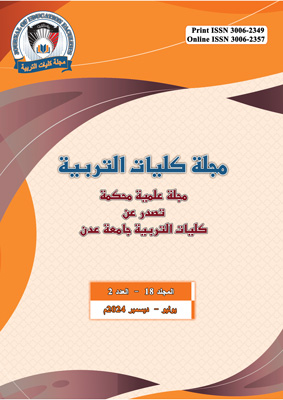Islamic Identiy in a Changing World
DOI:
https://doi.org/10.47372/jef.(2024)18.2.79Keywords:
Islamic Identity , DemocracyAbstract
In view of the importance acquired by the identity of the Muslim nation, it has been necessary for researchers to open the doors of studies and research related to the issue of identity and the problems that appear at every stage of its civilization, as it is renewed within the variables and established within the constants, and it is not possible, in any way, to turn a blind eye to the issues that affect it. Negatively or positively in the reality of its successive generations, every effort must be made to study this subject through my humble research, which I divided, in line with the principles of scientific research, into an introduction, an introduction, three sections, and a conclusion.
Introduction: Identity in Islamic heritage.
The first topic: Islam and democracy.
The second topic: The role of Islamic identity in developing the democratic system.
The third topic: Islamic identity and democracy from crisis to renaissance. As for the introduction: the researcher focused on analyzing the concept of identity by reviewing some Qur’anic verses that explicitly indicate the doctrinal and cultural distinction of the Islamic nation from other nations. As well as the importance of the humanitarian and civilizational stage that Islam inaugurated, according to which the Islamic nation assumed the leadership of humanity and the human civilizational movement, temporally and morally, just as it also shouldered the task doctrinally and legislatively, considering that the temporal responsibility is for Islam and its nation. Then I studied the concept of identity in our Islamic culture and heritage, studying it among Sufis, philosophers, and masters of the language, and then I looked at the factors that shape, influence, and develop the identity of the individual and the nation. As for the first section: the researcher studied Islam and democracy and the inevitable encounter between them and how that encounter supports diversity, enriches experiences, distinguishes the actual presence of both Islam and the civilizational and humanitarian experiences of other nations, and recalls the division that clearly emerged between the two dialogue groups deep within the Islamic nation, between those who welcomed democracy and those who rejected it. And its warriors.
As for the second section: the researcher studied the role of Islamic identity as a result of doctrinal faith, cultural awareness, and national feeling in accepting other human experiences through the democratic system, digesting it, and then supporting it with inputs that carry Islamic values and beliefs and cultural excellence, in an effort to develop tools and methods for managing life in accordance with the environment, culture, and Islamic civilization. Then it becomes pure and sincere, devoid of any dependency or influence on Western origin. Rather, the dust falling from those tools and methods has been removed over the ages, so that our goods return to us as they were gone. Then we sense the legitimacy of change, the importance and the role of identity in it, as well as the influence of identity in the Islamic theory of governance, and to what extent it is activated. Identity is the possibility of continuous development and renewal in aspects of life, tools and methods for managing them, and preserving the elements and components of Islamic civilization, such as justice, equality, respect for human rights and public freedoms, and activating the role of opinion and other opinions as the most important element in the structure and management of humanitarian work. As for the third topic: in it, the researcher spoke about identity and democracy and the transition of the relationship between them from crisis and discord to convergence and dialogue, then rising and continuing to lead the civilized movement, considering that the crisis of confrontation between them was due to the fatal crisis in awareness among the people of our Islamic nation and their lack of the tools and methods for change and renewal that it provides us with. The Holy Qur’an and the Sunnah of the Prophet at every time and place, and in the first and last, there must be integration between values and behavior and rising to the level of positive succession and civilizational witnesses.
As for the conclusion, it included a number of results and recommendations that the researcher considered important and necessary and serving the Islamic identity.
Downloads
Published
How to Cite
Issue
Section
License
Copyright (c) 2025 Journal of the Faculties of Education - University of Aden

This work is licensed under a Creative Commons Attribution-NonCommercial 4.0 International License.

